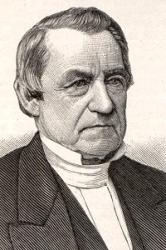Planning worship?
Check out our sister site, ZeteoSearch.org,
for 20+ additional resources related to your search.
- |
User Links
Search Results
Why, O God, Thy People Spurn?
Author: Edwin F. Hatfield Meter: 7.7.7.7 Appears in 24 hymnals Hymnal Title: The Cyber Hymnal Lyrics: 1 Why, O God, Thy people spurn?
Why permit Thy wrath to burn?
God of mercy, turn once more;
All our broken hearts restore.
2 Thou hast made our land to quake,
Heal the sorrows Thou dost make;
Bitter is the cup we drink;
Suffer not our souls to sink.
3 Be Thy banner now unfurled,
Show Thy truth to all the world;
Save us, Lord, we cry to Thee;
Lift Thine arm; Thy chosen free.
4 Give us now relief from pain;
Human aid is all in vain.
We, through God, shall yet prevail,
He will help when foes assail. Used With Tune: HEROLD
Why, O God, Thy People Spurn?
HEROLD
Meter: 7.7.7.7 Appears in 16 hymnals Composer and/or Arranger: Anonymous Hymnal Title: The Cyber Hymnal Tune Sources: Songs of the Sanctuary by Charles S. Robinson (New York: A. S. Barnes, 1875) Tune Key: a flat minor Incipit: 12712 34325 12712 Used With Text: Why, O God, Thy People Spurn?
HEROLD
Why, O God! thy people spurn?
Hymnal: Church Psalmist #P60 (1847) Hymnal Title: Church Psalmist Languages: English
Why, O God! thy people spurn?
Judgments deprecated
Hymnal: Church Psalmist #P60 (1845) Hymnal Title: Church Psalmist First Line: Why, O God, thy people spurn Languages: English
Judgments deprecated
Why, O God! thy people spurn?
Hymnal: Church Psalmist #P60 (1857) Hymnal Title: Church Psalmist Languages: English
Why, O God! thy people spurn?
Edwin F. Hatfield

1807 - 1883 Hymnal Title: The Cyber Hymnal Author of "Why, O God, Thy People Spurn?" in The Cyber Hymnal Hatfield, Edwin Francis, D.D., was born at Elizabethtown, New Jersey, Jan. 9, 1807, and educated at Middlcbury College, Vermont, and at Andover. From 1832 to 1835 he was pastor of the 2nd Presbyterian Church, St. Louis. In 1835 he removed to New York, where he was at first pastor of 7th Presbyterian Church, and then of the North Presbyterian Church (1856-63) in the same city; and in 1864 he was appointed special agent to the Union Theological Seminary, New York. He also held from 1846 the appointment of Stated Clerk of the Presbyterian General Assembly. He died at Summit, New Jersey, Sept. 22, 1883. His hymnological knowledge was extensive. His publications include:—
(1) Freedom's Lyre; or, Psalms, Hymns, and Sacred Songs, for the Slave and his Friends, N. Y., 1840, to which he contributed 24 hymns under the signature of “E. F. H."; (2) The Church Hymn Book for the Worship of God, N. Y., 18t2, in which are 10 of his hymns; and (3) Chapel Hymns, N. Y., 1873. (4) The Poets of the Church. Biographical Sketches of Hymn Writers, with Notes on their Hymns, New York, 1884. This was a posthumous publication, and is far from being accurate. His hymns and psalm versions in common use include:—
1. Come, bless Jehovah's name. (1837.) Psalms 134.
2. Come, let us gladly sing. (1837.) Psalms 95.
3. Hallelujah, praise the Lord. (1837.) Psalms 150.
4. How perfect is Thy law. (1837.) Psalms 19.
5. How sweetly breaks the Sabbath dawn. (1840.) Sunday.
6. My Shepherd's name is love. (1837.) Psalms 23.
7. 0 sing hallelujah, praise ye the Lord. (1837.) Psalms 146.
8. Thee, Thee, we praise, 0 God, and now. (1871.) A paraphrase of the Te Deum.
9. 'Tis Thine alone, Almighty Name. (1872.) Temperance.
10. Why, 0 God, Thy people spurn! (1837.) Psalms 60.
11. To God the Father, Son. Doxology. In Freedom's Lyre, 1840. It is widely used.
These hymns and psalm versions are all in his Church Hymn Book, 1872, and the dates appended above are from that collection. No. 10 was published in his Freedom's Lyre, 1810, No. 25. [Rev. F. M. Bird, M.A.]
-- John Julian, Dictionary of Hymnology
Edwin F. Hatfield
Anonymous
Hymnal Title: The Cyber Hymnal Composer of "HEROLD" in The Cyber Hymnal In some hymnals, the editors noted that a hymn's author is unknown to them, and so this artificial "person" entry is used to reflect that fact. Obviously, the hymns attributed to "Author Unknown" "Unknown" or "Anonymous" could have been written by many people over a span of many centuries.
Anonymous


 My Starred Hymns
My Starred Hymns


